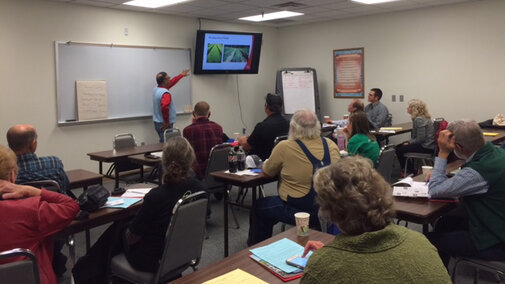Learn from successful practitioners and explore new ideas for creating a more diverse and sustainable farm or ranch operation at this year's Western Sustainable Ag Crops and Livestock Conference. The conference will be December 16 in Sidney at the Western Nebraska Community College, 371 College Drive, from 8:45 a.m. to 4 p.m. Pre-registration is due by Dec. 8.
The conference will cover a range of topics: managing for good and bad bugs, planting annual forage mixtures (cover crops) for cattle, transitioning to organic farming, gardening for profit, the business of new ag enterprises, and using solar panels.
The Western Sustainable Ag Crops and Livestock Conference was initiated by farmers who saw the need for a conference to bring research-based information about alternative and value-added agriculture to farmers and ranchers in western Nebraska, especially those looking for new ways to keep their operations sustainable, said Karen DeBoer, Nebraska extension educator and one of the conference organizers.
The conference will be at the Western Nebraska Community College, 371 College Drive in Sidney, from 8:45 a.m. until 4 p.m. Pre-registration is due by Dec. 8.
Sponsors include Nebraska Extension, Nebraska Sustainable Agriculture Society (NSAS), and Organic Crop Improvement Association Nebraska Chapter No. 2.
Growing Good Bugs, Decreasing Bad Bugs
Keynote speaker Nebraska Extension Entomologist Jeff Bradshaw will speak on “Good Bug, Bad Bug: Can we grow the former while we decrease the latter?” While roughly 90% of the known insect species on the planet have some beneficial role, Bradshaw said, in schools, homes, and agriculture an inordinate amount of time and expense is devoted to managing the remaining 10%.
Sustainability attempts to take the long view on people, planet, and profits. Therefore, in terms of sustainability in agriculture, the focus should be on the role that beneficial insects could have in improving yield while reducing inputs and input costs, Bradshaw said. He will discuss his research on beneficial insects in confection sunflowers, dry edible beans, and rainfed wheat as well as successes and challenges in managing insects.
Bradshaw's research focuses on applied ecology of insects and host plant resistance, primarily on crops common to the High Plains region. Follow Bradshaw on Twitter (@true_bug) or extension newsletters, including his stories in CropWatch.
Conference Topics and Speakers
Is Organic Farming for You? — Martin Kleinschmit of Hartington
Kleinschmidt has been farming for 50 years and has been in certified organic production since 1993. He manages a 380-acre farm and designs and manages several organic education programs for farmers and ranchers, including ones with Center for Rural Affairs. His presentation covers:
- organic requirements for certification,
- what to do during the transition period,
- the USDA Organic Transition Incentive Program through EQIP,
- the economic and environmental benefits of organic farming, and
- the hurdles to certification.
Using Annual Forage Mixtures (Cover Crops) for Beef Cattle — Karla Jenkins, cow/calf specialist at the UNL Panhandle Research and Extension Center
Jenkins will focus on growing annual forage mixtures (cover crops) in western Nebraska and how that differs from eastern Nebraska. She will also address the economics of grazing mixtures as well as projected gains. Her research program focuses on finding more efficient and economical ways to produce beef cattle while sustaining the range resource. Since 2009 she has been studying limit feeding energy-dense byproducts mixed with crop residues to maintain beef cows in confinement to provide grazing deferment for range, maintain a core herd from liquidation, or as part of a system to reduce dependency on pasture. She also evaluates annual forage crops and alternative uses for crops such as field peas or sugar beets as components in beef cattle diets to improve sustainability and efficiency of cattle operations in western Nebraska.
Nebraska Sustainable Ag Research and Education (SARE) Program — Gary Lesoing, Nebraska SARE Coordinator and Extension Educator
More on SARE in Nebraska.
Key Business Considerations of a New Agricultural Enterprise — Jessica Groskopf, regional extension economist
Groskopf will explain how starting a new agricultural enterprise entails more than just knowing how to produce the desired good. She'll address business considerations including initial investment, cash flow, insurance, government programs, and more.
Organic Farming: The Rewards and Challenges — Sara Fehringer, coordinator of Organic Crop Improvement Association High Plains Chapter 2, and Dennis Demmel, organic farmer from Ogallala
Fehringer and Demmel will also review the process of organic certification.
Gardening for Profit — A Panel of Local Producers who Raise Produce for Farmers’ Markets.
Converting to Solar Energy — Martin Kleinschmit
Kleinschmidt, who has worked in the renewable energy field since 1980, built his own 9,000-watt PV system in 2009 and then started his own solar business, MarLin Wind & Solar LLC. Kleinschmidt will discuss how solar Photo Voltaic (PV) panels work, what you need to know about net-metering, cost breakdown on a PV system, examples of solar systems, and sizing your solar system to fit your needs.
More Information
To register, use the form in the program brochure.
For more information about the conference or exhibitor booths, contact Extension Educator Karen DeBoer at the Extension Office in Sidney, telephone 308-254-4455 or email kdeboer1@unl.edu.

